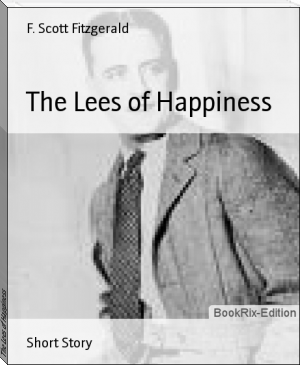The Lees of Happiness by F. Scott Fitzgerald (best books under 200 pages txt) 📕

- Author: F. Scott Fitzgerald
Book online «The Lees of Happiness by F. Scott Fitzgerald (best books under 200 pages txt) 📕». Author F. Scott Fitzgerald
THE LEES OF HAPPINESS
If you should look through the files of old magazines for the first years of the present century you would find, sandwiched in between the stories of Richard Harding Davis and Frank Norris and others long since dead, the work of one Jeffrey Curtain: a novel or two, and perhaps three or four dozen short stories. You could, if you were interested, follow them along until, say, 1908, when they suddenly disappeared.
When you had read them all you would have been quite sure that here were no masterpieces--here were passably amusing stories, a bit out of date now, but doubtless the sort that would then have whiled away a dreary half hour in a dental office. The man who did them was of good intelligence, talented, glib, probably young. In the samples of his work you found there would have been nothing to stir you to more than a faint interest in the whims of life--no deep interior laughs, no sense of futility or hint of tragedy.
After reading them you would yawn and put the number back in the files, and perhaps, if you were in some library reading-room, you would decide that by way of variety you would look at a newspaper of the period and see whether the Japs had taken Port Arthur. But if by any chance the newspaper you had chosen was the right one and had crackled open at the theatrical page, your eyes would have been arrested and held, and for at least a minute you would have forgotten Port Arthur as quickly as you forgot Château Thierry. For you would, by this fortunate chance, be looking at the portrait of an exquisite woman.
Those were tie days of "Florodora" and of sextets, of pinched-in waists and blown-out sleeves, of almost bustles and absolute ballet skirts, but here, without doubt, disguised as she might be by the unaccustomed stiffness and old fashion of her costume, was a butterfly of butterflies. Here was the gayety of the period--the soft wine of eyes, the songs that flurried hearts, the toasts and tie bouquets, the dances and the dinners. Here was a Venus of the hansom, cab, the Gibson girl in her glorious prime. Here was...
...here was you. Find by looking at the name beneath, one Roxanne Milbank, who had been chorus girl and understudy in "The Daisy Chain," but who, by reason of an excellent performance when the star was indisposed, had gained a leading part.
You would look again--and wonder. Why you had never heard of her. Why did her name not linger in popular songs and vaudeville jokes and cigar bands, and the memory of that gay old uncle of yours along with Lillian Russell and Stella Mayhew and Anna Held? Roxanne Milbank-whither had she gone? What dark trap-door had opened suddenly and swallowed her up? Her name was certainly not in last Sunday's supplement on the list of actresses married to English noblemen. No doubt she was dead--poor beautiful young lady--and quite forgotten.
I am hoping too much. I am having you stumble on Jeffrey Curtains's stories and Roxanne Milbank's picture. It would be incredible that you should find a newspaper item six months later, a single item two inches by four, which informed the public of the marriage, very quietly, of Miss Roxanne Milbank, who had been on tour with "The Daisy Chain," to Mr. Jeffrey Curtain, the popular author. "Mrs. Curtain," it added dispassionately, "will retire from the stage."
It was a marriage of love. He was sufficiently spoiled to be charming; she was ingenuous enough to be irresistible. Like two floating logs they met in a head-on rush, caught, and sped along together. Yet had Jeffrey Curtain kept at scrivening for twoscore years he could not have put a quirk into one of his stories weirder than the quirk that came into his own life. Had Roxanne Milbank played three dozen parts and filled five thousand houses she could never have had a role with more happiness and more despair than were in the fate prepared for Roxanne Curtain.
For a year they lived in hotels, travelled to California, to Alaska, to Florida, to Mexico, loved and quarrelled gently, and gloried in the golden triflings of his wit with her beauty--they were young and gravely passionate; they demanded everything and then yielded everything again in ecstasies of unselfishness and pride. She loved the swift tones of his voice and his frantic, if unfounded jealousy. He loved her dark radiance, the white irises of her eyes, the warm, lustrous enthusiasm of her smile.
"Don't you like her?" he would demand rather excitedly and shyly. "Isn't she wonderful? Did you ever see--"
"Yes," they would answer, grinning. "She's a wonder. You're lucky."
The year passed. They tired of hotels. They bought an old house and twenty acres near the town of Marlowe, half an hour from Chicago; bought a little car, and moved out riotously with a pioneering hallucination that would have confounded Balboa.
"Your room will be here!" they cried in turn.
--And then:
"And my room here!"
"And the nursery here when we have children."
"And we'll build a sleeping porch--oh, next year."
They moved out in April. In July Jeffrey's closest friend, Harry Cromwell same to spend a week--they met him at the end of the long lawn and hurried him proudly to the house.
Harry was married also. His wife had had a baby some six months before and was still recuperating at her mother's in New York. Roxanne had gathered from Jeffrey that Harry's wife was not as attractive as Harry--Jeffrey had met her once and considered her--"shallow." But Harry had been married nearly two years and was apparantly happy, so Jeffrey guessed that she was probably all right.
"I'm making biscuits," chattered Roxanne gravely. "Can you wife make biscuits? The cook is showing me how. I think every woman should know how to make biscuits. It sounds so utterly disarming. A woman who can make biscuits can surely do no----"
"You'll have to come out here and live," said Jeffrey. "Get a place out in the country like us, for you and Kitty."
"You don't know Kitty. She hates the country. She's got to have her theatres and vaudevilles."
"Bring her out," repeated Jeffrey. "We'll have a colony. There's an awfully nice crowd here already. Bring her out!"
They were at the porch steps now and Roxanne made a brisk gesture toward a dilapidated structure on the right.
"The garage," she announced. "It will also be Jeffrey's writing-room within the month. Meanwhile dinner is at seven. Meanwhile to that I will mix a cocktail."
The two men ascended to the second floor--that is, they ascended half-way, for at the first landing Jeffrey dropped his guest's suitcase and in a cross between a query and a cry exclaimed:
"For God's sake, Harry, how do you like her?"
"We will go up-stairs," answered his guest, "and we will shut the door."
Half an hour later as they were sitting together in the library Roxanne reissued from the kitchen, bearing before her a pan of biscuits. Jeffrey and Harry rose.
"They're beautiful, dear," said the husband, intensely.
"Exquisite," murmured Harry.
Roxanne beamed.
"Taste one. I couldn't bear to touch them before you'd seen them all and I can't bear to take them back until I find what they taste like."
"Like manna, darling."
Simultaneously the two men raised the biscuits to their lips, nibbled tentatively. Simultaneously they tried to change the subject. But Roxanne undeceived, set down the pan and seized a biscuit. After a second her comment rang out with lugubrious finality:
"Absolutely bum!"
"Really----"
"Why, I didn't notice----"
Roxanne roared.
"Oh, I'm useless," she cried laughing. "Turn me out, Jeffrey--I'm a parasite; I'm no goal----"
Jeffrey put his arm around her.
"Darling, I'll eat your biscuits."
"They're beautiful, anyway," insisted Roxanne.
"They're-they're decorative," suggested Harry.
Jeffrey took him up wildly.
"That's the word. They're decorative; they're masterpieces. We'll use them."
He rushed to the kitchen and returned with a hammer and a handful of nails.
"We'll use them, by golly, Roxanne! We'll make a frieze out of them."
"Don't!" wailed Roxanne. "Our beautiful house."
"Never mind. We're going to have the library repapered in October. Don't you remember?"
"Well----"
Bang! The first biscuit was impaled to the wall, where it quivered for a moment like a live thing.
Bang!...
When Roxanne returned, with a second round of cocktails the biscuits were in a perpendicular row, twelve of them, like a collection of primitive spear-heads.
"Roxanne," exclaimed Jeffrey, "you're an artist! Cook?--nonsense! You shall illustrate my books!"
During dinner the twilight faltered into dusk, and later it was a starry dark outside, filled and permeated with the frail gorgeousness of Roxanne's white dress and her tremulous, low laugh.
--Such a little girl she is, thought Harry. Not as old as Kitty.
He compared the two. Kitty--nervous without being sensitive, temperamental without temperament, a woman who seemed to flit and never light--and Roxanne, who was as young as spring night, and summed up in her own adolescent laughter.
--A good match for Jeffrey, he thought again. Two very young people, the sort who'll stay very young until they suddenly find themselves old.
Harry thought these things between his constant thoughts about Kitty, He was depressed about Kitty. It seemed to him that she was well enough to come back to Chicago and bring his little son. He was thinking vaguely of Kitty when he said good-night to his friend's wife and his friend at the foot of the stairs.
"You're our first real house guest," called Roxanne after him. "Aren't you thrilled and proud?"
When he was out of sight around the stair corner she turned to Jeffrey, who was standing beside her resting his hand on the end of the banister.
"Are you tired, my dearest?"
Jeffrey rubbed the centre of his forehead with his fingers.
"A little. How did you know?"
"Oh, how could I help knowing about you?"
"It's a headache," he said moodily. "Splitting. I'll take some aspirin."
She reached over and snapped out the light, and with his arm tight about her waist they walked up the stairs together.
II
Harry's week passed. They drove about the dreaming lanes or idled in cheerful inanity upon lake or lawn. In the evening Roxanne, sitting inside, played to them while the ashes whitened on the glowing ends of their cigars. Then came a telegram from Kitty saying that she wanted Harry to come East and get her, so Roxanne and Jeffrey were left alone in that privacy of which they never seemed to tire.
"Alone" thrilled them again. They wandered about the house, each feeling intimately the presence of the other; they sat on the same side of the table like honeymooners; they were intensely absorbed, intensely happy.
The town of Marlowe, though a comparatively old settlement, had only recently acquired a "society." Five or six years before, alarmed at the smoky swelling of Chicago, two or three young married couples, "bungalow people," had moved out; their friends had followed. The Jeffrey Curtains found an already formed "set" prepared to welcome: them; a country club, ballroom, and golf links yawned for them, and there were bridge parties, and poker parties, and parties where they





Comments (0)